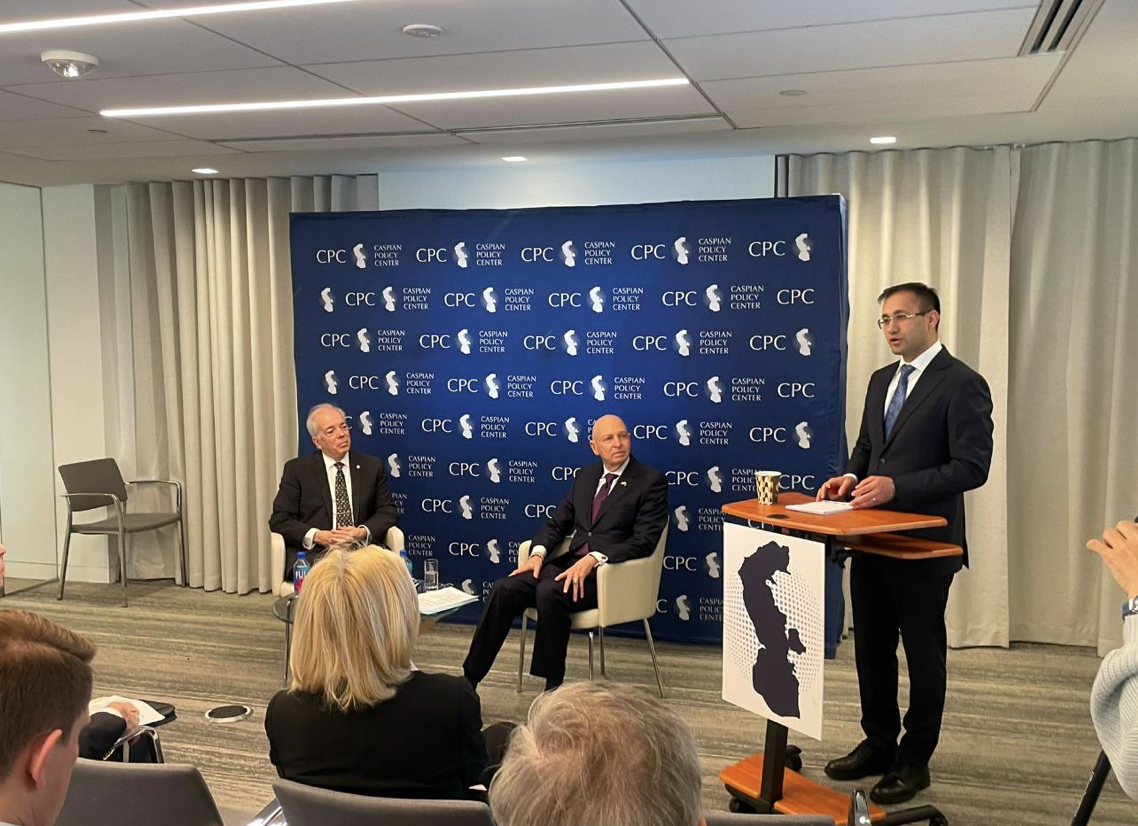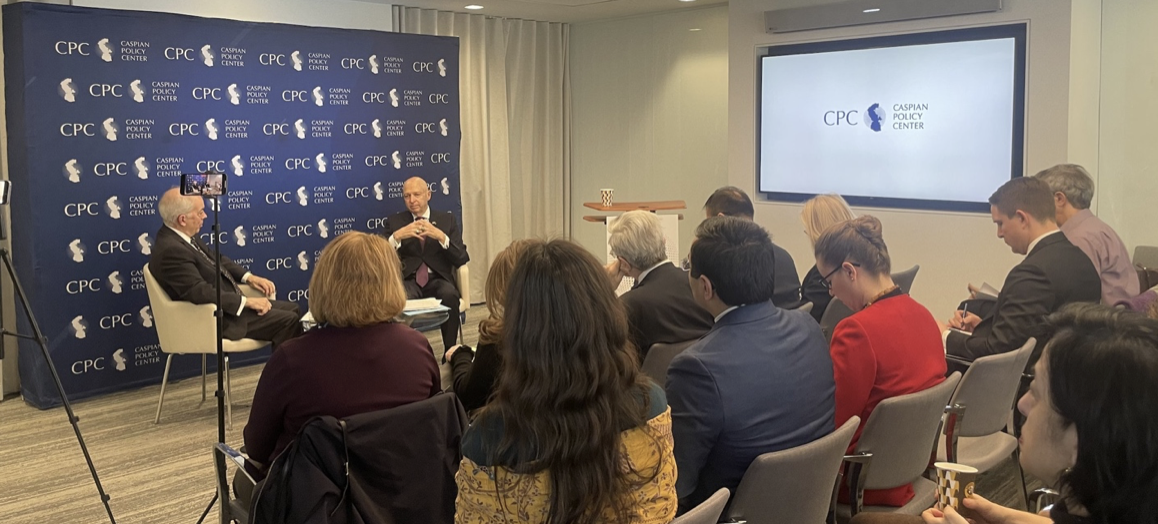Discussion with Ambassador (ret.) Matthew Klimow, Former Ambassador of the United States to Turkmenistan
Recent Articles
Author: Caspian Policy Center
01/29/2025
“I saw tremendous changes during my time in Turkmenistan in every sphere, whether that's political, trade, in business, or even in human rights,” said former U.S. Ambassador to Turkmenistan Matthew Klimow, during a discussion at the Caspian Policy Center on January 29. Klimow discussed political and economic developments in Turkmenistan and the Caspian region, offering insights into how Turkmenistan is perceived internationally while also examining the perspectives and policies of the Turkmen government on a range of key issues. Following the welcome remarks by CPC President Efgan Nifti, Chairman of the CPC Board Ambassador (ret.) Richard Hoagland introduced Klimow, and then CPC Senior Fellow Eric Rudenshiold moderated the discussion.

“My biggest challenge as ambassador was trying to paint an accurate picture of Turkmenistan for officials in Washington, or really for anybody. Turkmenistan in Washington circles suffers, even today, from years and years of negative reporting. That negative reporting, I think, obfuscated and overshadowed the progress that Turkmenistan has made over the [five] years I spent there,” said Klimow. He also discussed Turkmenistan's long-standing policy of "positive neutrality," highlighting its role in shaping the country's foreign relations, and noted how this policy has influenced Turkmenistan's diplomatic approach, allowing it to maintain balanced and independent relationships with other nations while avoiding entanglement in regional and global conflicts. “
“At the heart of Turkmenistan’s strategic interests is the drive for stability. Their view of what contributes to stability may be different…than what we may consider,” added Klimow. According to him, in Turkmenistan, there are both internal factors that push for stability, such as maintaining economic prosperity, as well as external factors, such as the threat of terrorism and drugs trade. “They’ve kept the Taliban and ISIS out of the country; Turkmenistan has also kept drugs out of the country. There is no tolerance for drug use or trade in Turkmenistan,” he stated.
Speaking on Turkmenistan’s regional relations, Klimow said, “Across Central Asia, amongst the C5 [the five Central Asia countries], there are solid relationships with all neighboring countries. The Russian invasion of Ukraine has shifted regional geopolitics drastically, and this shift was also felt in Turkmenistan. The invasion of Ukraine in their minds was so disastrous for regional stability ... [that] they sent clear diplomatic messages that they were very displeased with Moscow’s actions,” he emphasized.
 Klimow also gave his views on energy dynamics in the region, especially vis-a-vis Turkmenistan. According to him, Russia's proposal to form a so-called gas union with Kazakhstan and Uzbekistan by reversing the pipeline flow that once transported Turkmen gas to its Central Asian neighbors caused political friction between Russia and Turkmenistan. “While the relationship with Uzbekistan remains solid, Ashgabat’s relationship with Moscow really took a hit because of this. A ‘regional gas union’ proposed by Moscow is a no-go for Ashgabat,” he stressed.
Klimow also gave his views on energy dynamics in the region, especially vis-a-vis Turkmenistan. According to him, Russia's proposal to form a so-called gas union with Kazakhstan and Uzbekistan by reversing the pipeline flow that once transported Turkmen gas to its Central Asian neighbors caused political friction between Russia and Turkmenistan. “While the relationship with Uzbekistan remains solid, Ashgabat’s relationship with Moscow really took a hit because of this. A ‘regional gas union’ proposed by Moscow is a no-go for Ashgabat,” he stressed.
The now-retired ambassador also spoke on Turkmenistan being the first country in Central Asia that committed to the methane emissions pledge, and the U.S. role in helping Turkmenistan with reducing its emissions: “For methane emissions, the problems are in the aging infrastructure, pumping stations, old pipelines, unintentional flaring. The United States, I’m very proud to say, was the only international actor who came to Turkmen officials to bring them to the table, after which Ashgabat made a commitment to address these issues of methane emissions.”
About Turkmenistan’s relationship with China, the primary destination for Turkmen natural gas, Klimow said: “It’s important to recognize that Turkmenistan is not in debt to China. They have a good, functioning relationship with China; that’s where their cash comes from.”
With the recent shift of political leadership in Turkmenistan from Gurbanguly Berdimuhamedow to his son, Serdar Berdimuhamedow in 2022, Ambassador Klimow was asked to speak on how the decision-making process is conducted in the country with two centers of power.
“At a minimum, Gurbanguly Berdimuhamedow is the senior advisor to the President. The President, Serdar Berdimuhamedow, is not a figurehead, he’s the COO. When there are strategic decisions to be made that will impact Turkmenistan’s geopolitical stance over the years, that goes with consultation with Gurbanguly,” said Klimow.
 Ambassador Klimow addressed a wide range of other issues while speaking to the large in-person audience, including Turkmenistan's efforts to mitigate water and other environmental issues, counter-terrorism efforts, and its relations with the Taliban government in Afghanistan.
Ambassador Klimow addressed a wide range of other issues while speaking to the large in-person audience, including Turkmenistan's efforts to mitigate water and other environmental issues, counter-terrorism efforts, and its relations with the Taliban government in Afghanistan.
Lastly, Ambassador Klimow gave his views on what the priorities should be for the new U.S. administration regarding its bilateral relations with Turkmenistan. According to him, the bilateral relations should be based on respect for territorial integrity, sovereignty, and independence. “We are in a fight for influence in Central Asia with China and Russia. Russia has historic ties to former Soviet republics. China is close, but we are geographically far,” he said. Klimow added that continuing funding for cultural and educational exchange programs, as well as conducting routine congressional and other high-level visits, and the meetings with all Central Asian countries in the C5+1 format carries a lot of weight in Turkmenistan: “We should continue to utilize that for leverage.”
“Turkmenistan doesn’t take well to scolding, and I think the success of our bilateral relations lies in the fact that we meet them on their own terms. Their concept of positive neutrality should be understood. Of course, we have our own national interests, but we acknowledge their policy of positive neutrality. There’s a red line out there that is not clearly defined but which should not be crossed,” he emphasized in conclusion.